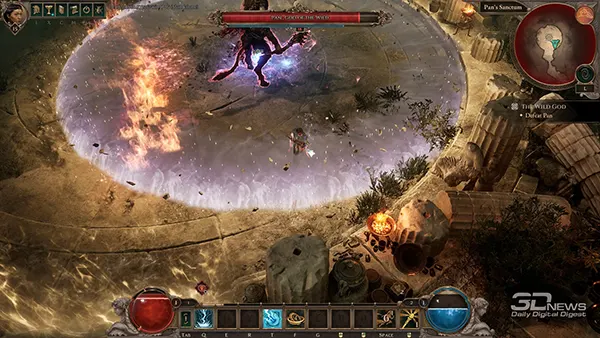The long-awaited return of the Titan Quest series is finally here with Titan Quest II, an ambitious open-world action RPG set in a richly detailed world inspired by ancient mythology. Developed by Grimlore Games and published by THQ Nordic, this sequel takes the essence of the original and expands it into a seamless world filled with gods, monsters, and legendary heroes. Built on Unreal Engine 5, the game promises deep combat systems, a flexible class structure, and a vast world where decisions truly shape the journey.
Expansive Mythological World
Titan Quest II is set in a meticulously crafted version of ancient Greece, blending authentic historical elements with fantastical mythological storytelling. Players can traverse sprawling landscapes, from sun-drenched coastal cities to dark underworld caverns. Each location is packed with side quests, hidden treasures, and lore fragments that enrich the overarching narrative and reward exploration.
The open world is designed with a seamless structure, allowing players to travel between regions without loading screens. Weather patterns, day-night cycles, and dynamic events give the environment a living quality, ensuring that no two adventures feel the same. This sense of immersion is further enhanced by a fully orchestrated soundtrack and lifelike NPC behaviour that reacts to the player’s actions.
Central to the worldbuilding is the tension between gods and mortals. The narrative delves into the consequences of divine meddling in human affairs, portraying deities as flawed and unpredictable forces. Players’ choices in dialogue and quest outcomes can affect alliances and alter the balance of power among rival factions and mythological beings.
Narrative Depth and Player Agency
The story is driven by complex moral decisions, offering multiple branching paths that reflect the player’s values. Choices influence not just individual quests but the state of entire regions, with repercussions visible in the political landscape and even the behaviour of local populations.
Dialogue systems are fully voiced, allowing characters to respond dynamically based on past actions. This creates a sense of continuity and consequence often lacking in traditional ARPGs. NPCs remember betrayals, alliances, and heroic deeds, shaping how they interact with the protagonist.
Player reputation plays a crucial role in shaping the narrative. Gaining favour with certain gods can unlock powerful blessings, while defying them may lead to devastating curses that permanently alter gameplay mechanics. This system intertwines narrative and gameplay, making decisions meaningful beyond immediate rewards.
Combat and Class System
Combat in Titan Quest II builds upon the fluid action of its predecessor while adding modern mechanics for deeper engagement. Battles are fast-paced yet tactical, requiring players to exploit enemy weaknesses, dodge attacks, and manage cooldowns efficiently. Each weapon type offers unique move sets, and combat animations are crafted with realistic weight and momentum.
The class system returns with an improved dual-mastery structure, allowing players to combine two distinct skill trees to create hybrid builds. Each mastery draws from mythological archetypes such as Spartans, seers, beast tamers, and shadow hunters, offering diverse playstyles from melee-heavy warriors to spell-focused strategists.
Progression is designed to be flexible, with respec options that let players experiment freely. Skill synergy has been expanded, enabling powerful combo effects when abilities from different masteries are used together. This encourages creativity and supports varied approaches to combat encounters.
Boss Fights and Enemy Design
Boss battles are a major highlight, featuring large-scale encounters with mythological creatures like hydras, gorgons, and titans. Each boss has unique phases, attack patterns, and weaknesses that demand strategic planning and mastery of mechanics.
Enemy design emphasises variety and challenge. Regular mobs are organised into factions with distinct behaviours, strengths, and resistances, ensuring that combat never feels repetitive. Enemy AI adapts to player tactics, forcing continuous adjustment of strategies.
Loot rewards are tailored to encourage exploration and risk-taking. Rare artefacts often require defeating powerful foes hidden in remote areas, rewarding persistence and curiosity. Equipment is visually distinctive, reflecting its mythological origins and reinforcing a sense of achievement.

Technical Innovations and Visual Style
Titan Quest II leverages Unreal Engine 5 to deliver striking visuals and expansive environments. Lighting, shadows, and textures are crafted with cinematic quality, while the art direction balances realism with mythic grandeur. The result is a world that feels alive yet otherworldly, capturing the essence of ancient myths.
The game is fully optimised for modern hardware, supporting high frame rates, 4K resolution, and advanced features such as ray tracing and HDR. Performance settings are highly customisable, ensuring smooth gameplay on a wide range of systems without sacrificing visual fidelity.
Sound design plays an equally vital role in immersion. Environmental audio dynamically shifts based on weather and location, while the orchestral soundtrack adapts to combat and exploration. Voice acting is delivered by a diverse cast of performers, adding authenticity and emotional weight to character interactions.
Future Content and Community Support
The developers have outlined a long-term support plan, promising regular content updates, expansions, and quality-of-life improvements. Community feedback is being incorporated into development, with plans for mod support to allow players to create their own quests, maps, and cosmetic items.
Multiplayer features are also being expanded. Cooperative play supports seamless drop-in and drop-out sessions, while competitive modes are planned to encourage replayability and community engagement. Shared-world events and seasonal challenges are expected to further enrich the endgame experience.
By focusing on sustained development and active community involvement, Titan Quest II aims to remain a living game world for years after launch, offering fresh challenges and new adventures long after the main story concludes.